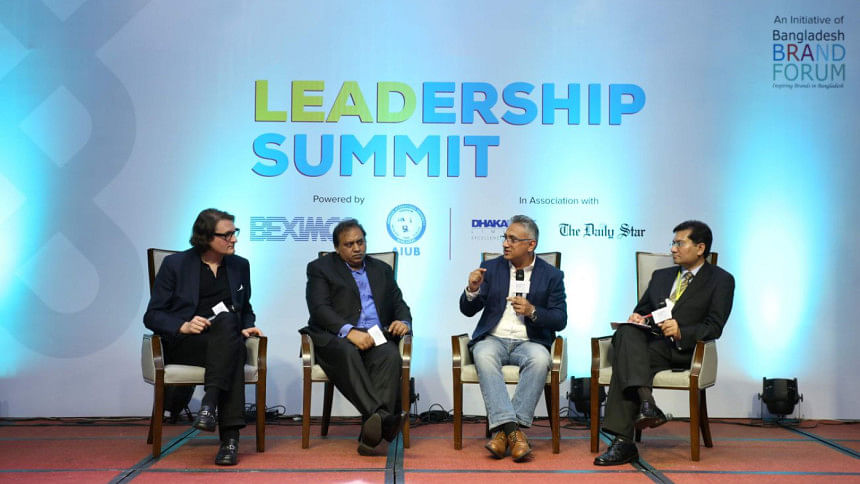Promote innovation for further growth

Bangladesh needs to promote innovation to take its economy and companies to the next level of growth, said experts yesterday.
Last year, Bangladesh came in at 114th spot in the Global Innovation Index.
Innovation is not an option; it is imperative, said Anir Chowdhury, policy adviser of the a2i Programme at the Prime Minister's Office, at the fifth Leadership Summit held at the Le Méridien hotel in Dhaka.
An initiative of Bangladesh Brand Forum, this year's summit was organised in association with Beximco, American International University Bangladesh, Dhaka Bank and The Daily Star.
The capacity for innovation in Bangladesh is high at the individual level but low at the government and academia level and medium at the industry level, he told a session titled 'Bangladesh Dialogue for the Next 10 Years'.
“Innovation has to be coordinated across the government, industry and society at large. An innovation culture must be nurtured everywhere.”
Bangladesh is in a poor shape in education, creative goods and services, human capital, research and environmental performance, he said. Subsequently, under the Bangladesh Mission Innovation 2041, the government plans to transform education for problem solving, facilitate research and development collaboration, enhance trust in government and simplify processes, mobilise financing and support commercialisation of innovations, and catalyse innovation by youth, women and persons with disability.
The country's education system has to make an improvement sooner so that it can drive innovation, said Arif Dowla, managing director of ACI. “The existing curricula promote memorisation rather than critical thinking.”
He went on to call for promotion of a culture of innovation within companies as the current system is largely hierarchical.
“We need to give a little bit of freedom to employees so that they can express their ideas freely,” he added.
Creating trust is crucial for innovations, said Robert C Wolcott, a clinical professor at the Kellogg School of Management of Northwestern University.
The Bangladesh government is committed to innovation, so the firms and start-ups already have a head start.
One of the most powerful forces reshaping markets for the coming generation would be production of products and services ever closer to the point of demand.
“True breakthroughs won't happen due to doing what we do today more efficiently. They will happen due to doing what was hitherto impossible,” said Wolcott, also a co-founder and executive director of Kellogg Innovation Network.
Bangladesh is ready to do a lot as it has untapped potential, said Yasir Azman, deputy chief executive officer at Grameenphone.
In the same session, one participant raised the issue of red tape and taxation, saying they are preventing ideas from coming to fruition.
The country has come a long way as a nation and as an economy and its performance in attaining the Millennium Development Goals is also a benchmark for others, said Shariful Islam, managing director of Bangladesh Brand Forum.
“Yet, the journey ahead needs innovations and proper planning and strategy to be executed by leaders for sustainable development.”
In order to flourish in the changing times, businesses should re-strategise, embrace and exploit the power of digital, strategically collaborate and partner, rethink modes of employment, and promote a 'start-up' mindset, said Mir Salim, principal of Boston Consulting Group, an American management consultancy firm.
Bangladesh needs multiple growth engines and focus, said Namrata Dubashi, partner of McKinsey & Company, another American management consultancy firm.
Successful development journeys concentrate on six to 10 sectors. “Prioritisation should follow a framework that will match national objectives with market opportunity.”
Bangladesh is poised to benefit from China's rebalancing, provided it leverages technology and upgrade skills, said Faisal Ahmed, chief economist of the central bank, in a session on the economy. There is no magic bullet in managing equity and social cohesion.
“A quantum leap is needed in our education, health and fiscal performance, both revenue and the equality of public expenditure. Finance, infrastructure, investment have to play their roles too,” he said in a presentation.

 For all latest news, follow The Daily Star's Google News channel.
For all latest news, follow The Daily Star's Google News channel. 



Comments